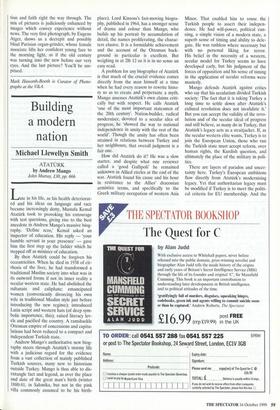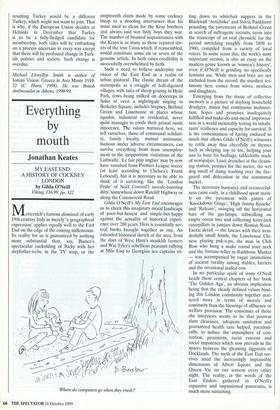Building a modern nation
Michael Llewellyn Smith ATATORK by Andrew Mango
John Murray, £.30, pp. 666
Late in his life, as his health deteriorat- ed and his ideas on language and race became increasingly dotty, Mustafa Kemal Atatark took to provoking his entourage With test questions, giving rise to the best anecdote in Andrew Mango's massive biog- raphy. 'Define zero,' Kemal asked an inspector of education. His reply — 'your humble servant in your presence' — gave him the first step up the ladder which he stepped off as minister of education.
By then Atatiirk could be forgiven his eccentricities. When he died in 1938 of cir- rhosis of the liver, he had transformed a traditional Muslim society into what was in its outward forms if not its inner reality a secular western state. He had abolished the sultanate and caliphate; emancipated women (conveniently divorcing his own wife in traditional Muslim style just before introducing the new regime); introduced Latin script and western hats (of deep sym- bolic importance, this); raised literacy lev- els and pacified the country. A ramshackle Ottoman empire of concessions and capitu- lations had been reduced to a compact and independent Turkish state.
Andrew Mango's authoritative new biog- raphy steers through Atatiirk's stormy life with a judicious regard for the evidence from a vast collection of mainly published Turkish sources, many new to historians outside Turkey. Mango is thus able to dis- entangle fact and legend, as over the place and date of the great man's birth (winter 1880-81, in Salonika, but not in the pink Villa commonly assumed to be his birth-
place). Lord Kinross's fast-moving biogra- phy, published in 1964, has a stronger sense of drama and colour than Mango, who builds up his portrait by accumulation of detail, the names proliferating, the charac- ters elusive. It is a formidable achievement and the account of the Ottoman back- ground in particular is excellent. But weighing in at 2Ib 12 oz it is in no sense an easy read.
A problem for any biographer of Atattirk is that much of the crucial evidence comes directly from the man himself at a time when he had every reason to rewrite histo- ry so as to create and perpetuate a myth. Mango assesses Atatiirk's own claims criti- cally but with respect. He calls Atatiirk 'one of the most important statesmen of the 20th century'. Nation-builder, radical moderniser, devoted to a secular idea of progress, he 'showed the way to national independence in amity with the rest of the world'. Though the amity has often been strained in relations between Turkey and her neighbours, that overall judgment is a fair one.
How did Atattirk do it? He was a slow starter, and despite what one reviewer called a 'good Gallipoli' he remained unknown in Allied circles at the end of the war. Atatiirk found his cause and his hour in resistance to the Allies' draconian armistice terms, and specifically to the Greek military occupation of western Asia Minor. That enabled him to rouse the Turkish people to assert their indepen- dence. He had will-power, political cun- ning, a simple vision of a modern state, a superb sense of timing and ability to dele- gate. He was ruthless where necessary but with no personal liking for terror. His belief in the necessity of a western, secular model for Turkey seems to have developed early, but his judgment of the forces of opposition and his sense of timing in the application of secular reforms were masterly.
Mango defends Atattirk against critics who say that his secularism divided Turkish society: 'The fact that it is taking Turkey a long time to settle down after Atattirk's cultural revolution does not invalidate it.' But you can accept the validity of the revo- lution and of the secular ideal of progress and still believe, as many do in Turkey, that Atatink's legacy acts as a straitjacket. If, as the secular western elite wants, Turkey is to join the European Union, those who run the Turkish state must accept reform, over human rights, the Kurdish question, and ultimately the place of the military in poli- tics.
There are layers of paradox and uncer- tainty here. Turkey's European ambitions flow directly from Atattirk's modernising legacy. Yet that authoritarian legacy must be modified if Turkey is to meet the politi- cal criteria for EU membership. And the resulting Turkey would be a different Turkey, which might not want to join. That is why, if the European Union decides at Helsinki in December that Turkey is to be a fully-fledged candidate for membership, both sides will be embarking on a process uncertain in every way except that there will be profound change in Turk- ish politics and society. Such change is overdue.
Michael Llewellyn Smith is author of Ionian Vision: Greece in Asia Minor 1919- 22 (C. Hurst, 1998). He was British Ambassador in Athens, 1996-99.



















































































 Previous page
Previous page